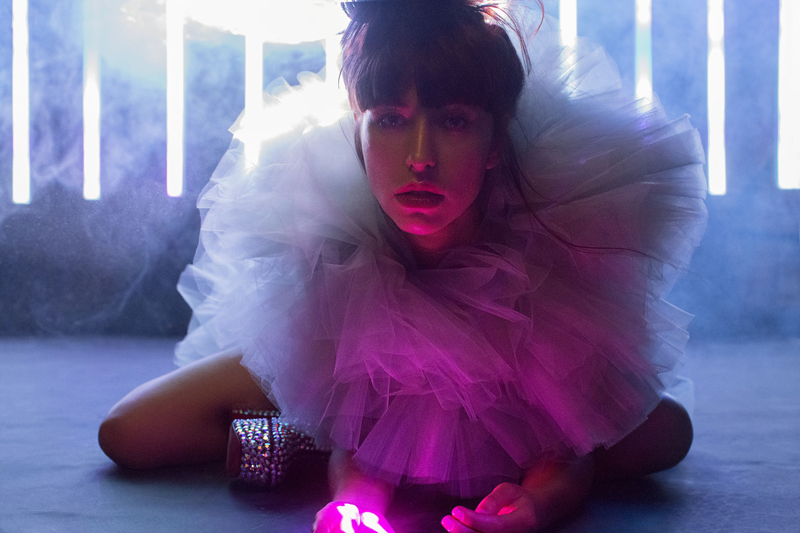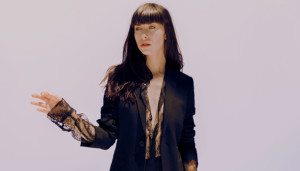Q&A: Kimbra challenges herself and others on ‘Primal Heart’

Courtesy: Micaiah Carter
Visiting churches on Sunday mornings not only helped Kimbra find a deeper meaning of love, but impacted her forthcoming third album, Primal Heart. Before the singer-songwriter moved from Los Angeles to Manhattan, she enjoyed walking up early on Sundays, going for a walk, and finding a new church to visit. On one of these visits, she caught presentation from a charity about its annual trip to Ethiopia to work with HIV-positive women. Immediately, Kimbra was inspired.
Kimbra
Arc Iris
8 p.m., Tuesday
The Regency Ballroom
Tickets: $25-$30.
“Sometimes when you think about a decision for too long, you won’t do it, you know?” she said earlier this week on a call from her tour bus, somewhere in the plains of North Dakota, as she worked on a watercolor painting of a forest. “So I just kind of decided that maybe I was being called to be a part of that.”
This was in 2015, and she would make two trips to the country over the next two years, during which she fell in love with the mission of the charity, Tirzah, to empower women to become self-sustainable and raise their children by building business. The delegation from Tirzah would listen to the Ethiopian women’s stories, form friendships, sometimes financially support them and learn from them.
“I was … super blown away by the experience I had there and it just taught me so much about the human experience and how we are all so connected in more ways than we think,” she said. “We look at people in other parts of the world [and think], ‘I could never relate to that life.’ When you sit down and talk with another woman who’s 27 years old, who may have five children and HIV, at the end of the day, a lot of your emotional world comes down to the same things that I may feel: Loneliness or anxieties or insecurities. It was just really encouraging to meet other people and realize there’s just something very primal about the human experience. [There are] so many ways that we are connected. And I think that’s what began my journey to write a record that reflected some of my feelings around that.”
Primal Heart, which will be released April 20, is a different type of album for 27-year-old Kimbra Lee Johnson.
While it retains the R&B sensibilities and pop structure of 2014’s The Golden Echo, there is a higher reliance on bass-heavy sonics, simplified arrangements and direct lyricism. There’s also only one collaboration. While she worked with Muse’s Matt Bellamy, John Legend and The Mars Volta on the 2014 LP, a beat created by Skrillex on early single “Top of the World” and co-production duties by John Congleton are the only physical contributions from others here.
It’s certainly different from the Gotye song that catapulted her into American consciousness (she was doing just fine before that in her native New Zealand). The Grammy-winning “Somebody That I Used To Know” has been certified quadruple platinum, and the video has been watched one billion times.
“I got a heart that’s primal,” Kimbra sings on “Human,” the closest thing to a title track on Primal Heart, as squeaky synths loop behind her. On airy single “Everybody Knows,” she layers xylophone over sleek bass. On that song and the tribal “Top of the World,” which has her near-rapping over a militaristic beat, Kimbra has her say about the problems the world is facing today.
Some of those issues she came to understand better only after having the time to expand her experience through her travels to Ethiopia, which itself occurred by “just pure curiosity.”
You have had quite a few changes over the last few years, since we last spoke. The change begins with you no longer living on an urban farm in L.A., where you were based when you wrote The Golden Echo. You traded that idyllic existence for something much more cosmopolitan; why?
Kimbra: I think I wanted to be immersed in the sort of vitality of life, you could say. Or I wanted to be confronted with reality and just sort of experience life. New York—everything is right in front of you, you know? All the good and the bad. You have to step out of your door, out of your apartment and just face the world. With L.A., you can create kind of a little bubble and escape a lot. That was beautiful at times for me. But I think, especially after going to Ethiopia and engaging with people in a different way, and seeing the different ways that people live their lives, I wanted to be in that intensity and in that sort of vibrancy. … I felt like I really belonged and that I could really be myself, and [that] helped me to accept a lot of things about the world as well, seeing it all up close like that.
I feel like the world is full of possibility every time I step out of my door. But it demands a different side of me as well. It demands me to be a much more direct person. It demands me to be a lot more in touch with the world around me. New York asks that of you. … You can’t deny things, you can’t walk away from them, because they demand you to stare them in the face, you know? I think that was important for me when writing this album, as well, because I knew that I wanted it to be a lot more direct. [In] my apartment, I created a zen space for myself, so it’s not like I’m living right in the intensity of it. I still manage to take that stillness that I found at the farm and in New Zealand.
In what ways did you want to make your third record different from your second?
I wanted to write songs that were quite to the point. I wanted to find a way to say more with less. In the past, because I’m quite hyperactive in the studio, I [had] a lot of ideas at once and I wanted to execute all of them. But I knew that with this new journey I was taking, I had to learn to trim away anything that got in the way of the core message, and search for that feeling of instinct. … If it was anything less than that, I kept pushing to find that moment of connect with myself and with others. And that meant playing stuff to people a lot, and having other people over to give me thoughts on things, and … not being scared to throw something away if it just wasn’t feeling right. I was more precious in the past with things. If I loved the bass line on something, I’d be like, “This is the best thing ever, and we have to finish this and put it on the album!” For this album I was like, “Look if it doesn’t really capture you in that place of deep knowing and primal connection, then I’m just going to move on to something else.”
I wanted to capture some feeling of familiarity and intimacy with people, and that meant turning the vocals up a lot more than I used to, as well. I wanted to feel uncomfortable at points in the process, as well. … I wanted someone to challenge me, I wanted to pick a co-producer [John Congleton of St. Vincent and Lana Del Rey fame] that would help me access a different side of myself that I hadn’t really shown before.
A term that’s frequently been used to describe the new album is “confrontational.” How is that part of the narrative?
Some of that is to do with the production on it, like going for punchier drum programming, for heavier bass, for more primal instrumentation; stuff that feels a bit even more punk rock in its approach, because it’s less decorated and more direct. But I think the “confrontational” [is] me opening up and being able to just speak a little more directly to the things around me.
“Top of the World” is an observation of greed in the world, and the delusion of power, and looking at myself and observing that, “You know, I, too, have an ego.” We all do. We [are] all striving for power. … How can you not speak to the greed and the blindness that people find themselves in when they lust after one thing. There’s something confrontational in the way I deliver that song.
“Everybody Knows”: the lyrics, “I was young and gullible, but baby I grew,” and “The whole world’s watching you.” There’s not really any metaphor in there, you know? It’s very to the point and personal and involved. I don’t think you get to that point until you’ve done some time with yourself, finding your confidence, finding your courage and finding your strengths.
“Everybody Knows” is about a toxic situation and how you deal with it. Can you elaborate?
I think both “Everybody Knows” and “Top of the World” kind of talk to the subject of blindness. “Everybody Knows” feels like the “waking up,” seeing things as they are, coming to the light—whatever you want to call it—and then finding the courage to accept that and acknowledge it. “Top of the World” is about that process of blinding. This is all stuff that, to me, is very integral to the “primal heart.” We often are in these cycles of enlightenment and then self-destruction. I’d say that song, especially, is one that really summarizes the strength of me being able to face things … and also reveal myself more to my audience.
I keep reading about how R&B was a big influence on the record this time round. But I’ve listened to your other stuff, and I know that R&B has been a big influence for a while now. Why do you think some are just now noticing it?
Yeah, that is interesting, because I agree. It’s always been part of my palette. … The beauty of the genre of R&B is that it’s very good for expressing really intimate subjects. It’s the genre of romantic lyrics and intimacy. But what I’ve been noticing about modern R&B with artists like Frank Ocean or Kelela, or even Little Dragon, [who] are kind of new R&B, [is that] there’s some things really confessional about it, and people are uncensored in R&B at the moment, or a bit more forward.
So perhaps it’s that you’re combining R&B sounds with more personal lyricism that makes the music more recognizable as R&B?
What I think R&B is doing really well at the moment—I’m really excited that it’s kind of becoming a really mainstream genre—is doing things in an effortless kind of way, and being more understated and subtle and sexy. You have to have a certain kind of confidence as an artist to access that place. I was just listening to a lot of that kind of music at the time and just thinking I want to find this kind of inner knowing and ability to say a lot with very little.
With each new thing that you do, you distance yourself a little more from “Somebody That I Used to Know.” Do you find that the separation comes easier?
I haven’t actually thought too much about it consciously, because I truly do think that it’s just my responsibility to make a great record and do what feels right for me at that time. Worrying too much about public perception is really dangerous.
Follow Roman Gokhman at Twitter.com/RomiTheWriter.

